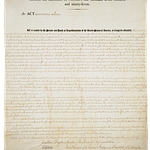This Day in Legal History: The Maastricht Treaty Creates the EU
On this day in legal history, the Maastricht Treaty stands out as a monumental agreement that reshaped the political and economic landscape of Europe. Signed on February 7, 1992, by the members of the European Community, this pivotal treaty marked the foundation of the European Union (EU), a milestone in the integration of European countries. Officially known as the Treaty on the European Union, it signified a new era of cooperation and unity among its signatories.
The Maastricht Treaty introduced significant legal and political changes, establishing the EU’s three-pillar structure consisting of the European Communities, Common Foreign and Security Policy, and Justice and Home Affairs. This structure was designed to enhance economic collaboration, ensure stability, and promote a more harmonized approach to external relations and internal affairs among the member states.
Going into force on November 1, 1993, the treaty set the stage for the introduction of a single European currency, the Euro, and laid the groundwork for the creation of the Schengen Area, enabling passport-free movement across member states. Furthermore, it established the criteria for membership in the EU, known as the Copenhagen criteria, setting the standards for new members aspiring to join the Union.
Over the years, the Maastricht Treaty has undergone several amendments through subsequent treaties, such as those of Amsterdam, Nice, and Lisbon, each refining and expanding the EU's powers and scope. These amendments have contributed to the evolution of the EU, making it more efficient and better equipped to face the challenges of the 21st century.
Today, the Maastricht Treaty is celebrated not only as the birth certificate of the European Union but also as a groundbreaking achievement in the quest for European integration and peace. Its signing on February 7, 1992, remains a landmark moment in legal and political history, illustrating the power of diplomacy and the enduring quest for unity among diverse nations.
A US federal appeals court recently provided the Supreme Court with a potential exit from engaging in a dispute over Donald Trump's claim of immunity from criminal prosecution for alleged election interference. The US Court of Appeals for the DC Circuit issued a clear, well-reasoned 57-page decision unanimously rejecting Trump's assertion of absolute immunity for actions taken while in office, stating that such a claim "is unsupported by precedent, history or the text and structure of the Constitution." Legal experts commend the decision for its persuasive reasoning and thorough refutation of Trump's arguments, suggesting that the Supreme Court might be inclined to let the appellate court's ruling stand, avoiding further entanglement in Trump-related controversies.
The decision was notable for its unanimous agreement among the judges, including appointees from both George H.W. Bush and Joe Biden, highlighting the legal community's broad consensus against Trump's position. The court criticized Trump's interpretation as "implausible," noting the lack of any precedent for requiring impeachment before criminal prosecution of federal officials. This unified stance from a diverse panel sends a strong signal to the Supreme Court, potentially reducing the likelihood of the justices taking up the case.
Trump's response to the decision was sharply critical, framing it as detrimental to the presidency and the country, and his legal team is expected to seek Supreme Court intervention. Meanwhile, the backdrop of the 2024 presidential election adds complexity to the situation, with Trump facing charges related to his actions after the 2020 election and another legal battle regarding his eligibility to appear on Colorado's 2024 primary ballot under the 14th Amendment.
Despite the DC Circuit's attempt to simplify the Supreme Court's decision-making process, the unprecedented nature of prosecuting a former president may compel the justices to review the case. Legal scholars are split on whether the Supreme Court will engage, recognizing the clear reasoning of the appellate court but also acknowledging the case's significant implications. Regardless of the Supreme Court's choice, the DC Circuit's decision stands as a robust rebuttal to Trump's claims, reinforcing the principle that no individual is above the law.
DC Circuit Gives Supreme Court Easy Out of Trump Immunity Fight
Trump's New York criminal case, likely first for trial, faces crucial test | Reuters
Mergers and acquisitions (M&A) lawyers are experiencing a significant increase in workload due to the rising use of earnouts, a financial tool allowing buyers to delay full payment for a transaction until after the seller meets certain milestones. This tool has become particularly popular in recent years, especially in slow economic climates, as it helps bridge the gap between the buyer's and seller's price expectations while protecting buyers from future risks. Earnouts are now a common feature in negotiations, with their usage soaring in the last five years, contrasting sharply with the decline in overall deal volume.
According to Bloomberg data, there were $80.2 billion in deals involving contingency payments last year, highlighting the growing reliance on earnouts despite a downturn in the economy and a drop in transaction volumes to $3.6 trillion, the lowest in recent years. The complexity of defining milestones and calculating payments significantly slows down transactions, increasing the legal work required to finalize deals.
Earnouts have been particularly prevalent in the health and technology sectors, where early-stage companies often need capital for research and development before proving their concepts. These arrangements require careful negotiation to ensure both buyers and sellers agree on the metrics and accounting practices used to determine payouts.
While earnouts can provide sellers with a significant portion of the sale price, they also introduce a level of uncertainty, as sellers must trust buyers to meet milestones that trigger these payments. Lawyers often advise sellers to be satisfied with the initial payment received at closing, treating any earnout payments as a bonus rather than a guaranteed sum.
Disputes over earnouts are becoming more common, with an increase in legal dockets mentioning both earnouts and M&A. Lenders also play a critical role in these deals, often setting limits on earnout payments to prioritize repayment terms. Despite the potential for conflict, litigation remains relatively rare, as parties typically find it more beneficial to negotiate resolutions.
M&A Lawyers See Flood of Work From Tool That Delays Deal Payouts
Marilyn Mosby, the former top prosecutor of Baltimore, was convicted in federal court for making a false statement on a mortgage application related to purchasing a Florida condominium. This conviction adds to her legal troubles, following two perjury convictions three months prior, where she was found guilty of falsely claiming financial hardship under the COVID-19 related provisions of the federal CARES Act to withdraw funds early from her retirement account. These funds were used for down payments on two Florida vacation properties. Despite being acquitted on a second count of falsifying a mortgage application for another Florida home, Mosby faces significant legal penalties, with the possibility of up to 30 years in federal prison for the mortgage application conviction and up to five years for each perjury count.
Mosby, who gained national attention in 2015 for charging police officers in the death of Freddie Gray, had her career trajectory altered dramatically by these charges. At the time of the alleged offenses, she was earning a nearly $250,000 annual salary as Baltimore's state attorney. The case against her included allegations of misrepresenting a financial transaction between her and her husband to secure a lower mortgage rate. Mosby contends that the charges against her were politically motivated, aimed at undermining her re-election bid. The sentencing hearing for both cases has not yet been scheduled by U.S. District Judge Lydia Griggsby.
Ex-top Baltimore prosecutor convicted of falsifying mortgage application | Reuters















Share this post